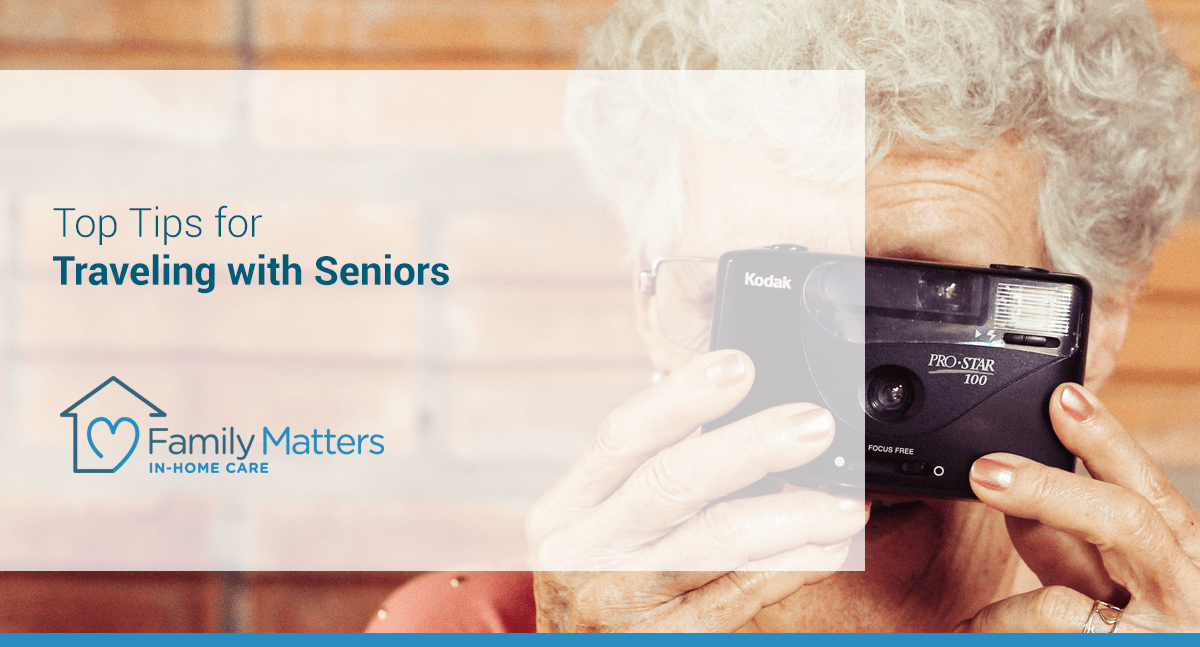
Top Tips for Traveling with Seniors
For seniors, travel can be especially challenging or risky. Use these top tips to make senior travel fun and safe.
As adults age, their family members tend to act as long-distance caregivers. The average distance a long-distance caregiver lives from a senior is 450 miles. That means if seniors travel to see their loved ones, they often go a long way.
It’s common for seniors to have some trouble getting around like they used to. So, it’s not surprising that long-distance travel can be a real challenge. Here’s how to make travel safer and more comfortable for aging adults.
Options for Travel for Seniors
Although seniors can travel by plane, train, or car, each option has pros and cons.
Traveling by Plane
Pros:
- A fast form of travel
- Can earn loyalty program points
- Often accommodates disabilities
Cons:
- Airports can be overwhelming
- Might be expensive
- Some are afraid of flying
Traveling by Train
Pros:
- Access to many locations
- Passes by moderately fast
- May allow for socializing
Cons:
- Routes can be inconvenient or confusing
- Limited options for stops and pricing
- Limited accessibility for those with disabilities
Traveling by Car
Pros:
- Control over routes/stops
- Can add cushions/supports for comfort
- Often most affordable
Cons:
- Can take a long time
- A possibility of getting lost
- Driving alone may not be safe
How Seniors Can Travel with Ease
For safe, comfortable, and fun travel experiences, seniors can use the following tips:
Prepare Ahead of Time
- Practice using a map app, write down directions
- Contact airports or train stations to learn about available assistance options
- Pack vital items in a carry-on or easily accessible bag in case of emergency or change of plans
- Research parking options (get a disability tag if necessary)
- Consult a doctor about plans if travel is a concern for medical reasons
- Know where medical facilities are located at travel destination
Ask Questions
Don’t be afraid to ask other people for help while traveling. Try to ask people who work wherever you are (in a hotel, airport, etc) for safety reasons. Never offer strangers more details than necessary when asking for help.
Bring Someone/Share With Loved Ones
- Find a friend or relative to travel with
- Inquire about traveling caregivers if assistance will be needed
- Share your location on your phone, as well as copies of your itinerary, with loved ones
A Senior’s “Bonus” Packing List
Although some of these items may be on most adults’ packing lists, they tend to be extra important for seniors to ensure their safety and comfort:
- Medications/supplements
- Support pillows or cushions
- Ambulatory/medical devices
- Hearing aid batteries
- Doctor list/medical alert information
- Compression socks
- Dentures holder/cleaner
Seniors may have difficulty estimating their need for downtime or rest while traveling. Encourage them to make plans that can be flexible so they can enjoy their time away.
If you or your family member is considering in-home care as part of a plan to age in place, contact Family Matters In-Home Care today for a free consultation. Our team is dedicated to supporting your family and helping older adults enjoy life in the comfort of their own home for as long as possible.
Some of the services offered by Family Matter In-Home Care include: Alzheimer’s & Dementia Care, Bed & Wheelchair Transfer Assistance, Companionship, Housekeeping & Meal Preparation, Personal Care, Recovery Care, and Transportation.
Serving the San Francisco Bay Area and Greater San Diego, Family Matter In-Home Care has offices throughout California including: Campbell, CA, Roseville, CA, San Marcos, CA, and San Mateo, CA.
Sources:
- https://cdn2.hubspot.net/hubfs/1708580/Marketing%20Monthlies/PDFs%20from%20Windfarm%20Marketing/0419-TravelTips-RGB.pdf
- https://www.caregiver.org/caregiver-statistics-demographics
- https://www.aarp.org/research/topics/life/info-2016/2017-travel-trends.html
- https://www.betterhealth.vic.gov.au/health/healthyliving/travel-tips-for-seniors
- https://traveltips.usatoday.com/travel-tips-elderly-13507.html
